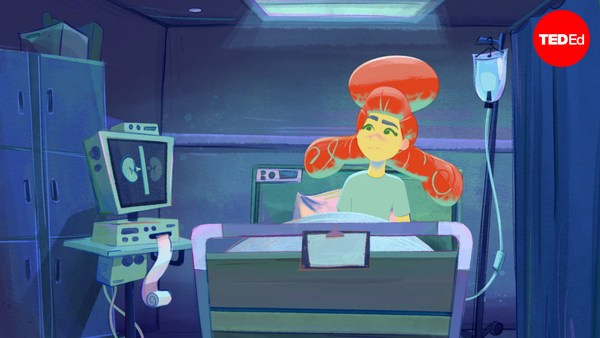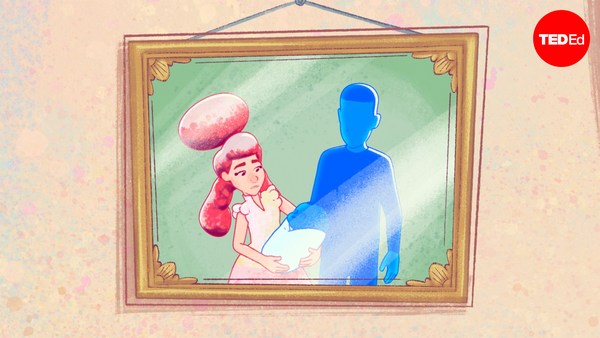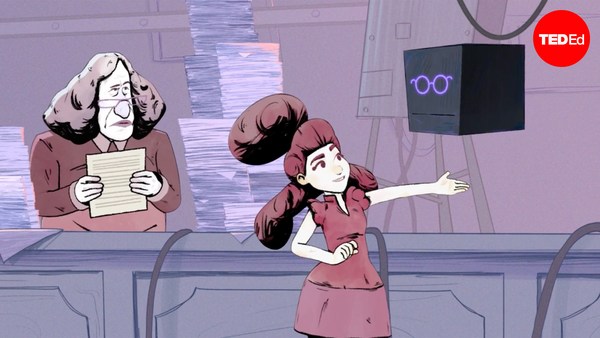Hi, I’m Ada. In this series, I tackle some of life’s pressing existential questions, like “what’s the best way to survive the apocalypse?”
Do you ever look around and think, how is everyone just going about their business when there are so many ways the world could end? I want to shake them. Not that they'd listen to me. Not yet at least.
Oh! Good morning. Oh, sorry.
You must be Ada, our new clerical assistant. You’re late.
Three minutes.
Let me show you around.
Um, I, uh, this library is amazing. Um, you know, I basically lived in a library when I was writing my philosophy thesis on—
You’ll sit at reception and help patrons with the Wi-Fi password or returning a book, things like that. Anything more complicated, you come get me. And when there are no patrons, there’s plenty to keep you busy.
Every minute that passes, you could spend doing something. Something important, or more important than this, at least. But you also have to work, and eat, and sleep, and pair socks, and make other tiny attempts to exert order on the chaos of the universe.
Excuse me, could you help me find these books?
Hmm. Biochemistry, Saccharomyces cerevisiae life cycle. You must be a scientist.
A former scientist. I was a nuclear physicist. Now I brew craft beer.
But why?
Brewing beer is the perfect blend of art and science. And after years tucked away in a lab, I wanted to do something real, something tangible. I love being able to see the joy on someone’s face when they taste my beer.
Ah, okay, I’m just gonna say it. We— I mean we, humanity— always seem to be just around the corner from catastrophe, and you had the chance to actually do something about that and chose not to.
I’m... I’m sorry?
How much joy do you think craft beer will bring when we’re trying to survive the apocalypse?
Um, well, I’m not sure I’d want to survive the apocalypse, as you put it. I mean, think for a second what it would actually be like to lose almost everyone and everything you care about.
But it wouldn't necessarily be like that. Yes, you would lose a lot. But even in a truly global catastrophe, there would almost certainly be places where most people and infrastructure survive.
And have what kind of life, though?
So, say our town survives. We have a lot of luxuries— bars, and coffee shops, and souvenir stores selling magic crystals.
Hey, sounds like I'll need protection from negative energy more than ever.
Mhm. Without the interconnected global systems we relied on, we’ll have to find ways to produce food, medicines, electricity, fuel, and clean water locally. Our best bet to survive in the long run is to collaborate— within our town, of course— but also with whatever other survivors we can contact.
Hey! Everyone! We need to ration our food until we can call for help— hey!
She wants to invite outsiders in to take our food!
No, that’s not what I said—
(Crowd booing)
Look around. People are desperate. Even if other survivors don’t raid us, I doubt they’ll help. Especially when we have nothing to give in return.
Electricity, then. Let's work on that. Getting the nearest power plant back up and running will be a massive effort. Hey, people, listen to me! Everyone listen, I—
(Crowd booing)
Guys, electricity will make things so much better. We’ll do it for ourselves. Not to contact other people. Right?
Ugh, it runs on coal.
Actually, fossil fuels are easier to use than more advanced technologies.
So you’re proposing mining for coal? That doesn't sound easy.
No, but there are other things we can burn in a coal plant. We've got lots of wood which we can use to make charcoal, which is more compact and burns way hotter than wood. It’s not as efficient as coal, but it’s the best option we have. To fuel the power plant and get the local grid back on, we’re going to need a lot of charcoal. No one will get any electricity unless everyone works together.
Okay, okay. There are ways to get a little electricity with a lot less fuel. They’ll thank me later.
The internet? Cellular data? Ugh. Even landlines rely on physical infrastructure that seems like it’s all been disrupted.
Hmm. Okay, so how can I get a message out? Well, radios pick up signals in the air. You can make a simple radio that doesn't even need electricity pretty easily. In World War Two, prisoners of war scavenged the materials to make them.
Any old wire will work as an aerial. It’ll pick up the electromagnetic fields of passing radio waves. Lots of common substances can complete the receiver and make messages intelligible, including... a number of crystals.
It's for the best.
(Radio static)
The Svalbard Seed Vault has hundreds of millions of seeds... on an island in the Arctic Circle. Apparently, seaweed is a good food source, but we’re nowhere near the sea. Whoa! Paper mills can be retrofitted to process wood into food. They break down wood in big vats. Then, instead of making the pulp into cardboard or paper, they use enzymes to convert the cellulose into edible sugar.
Okay, focus. We don’t have a paper mill, but we have plenty of wood.
Hello? Can you hear me? We can trade wood for— hey!
We don’t want outsiders flocking to our town!
I'll find out who stole my stolen generator and steal it back.
We're distilling alcohol to use for antiseptic and fuel.
A big vat for grinding things up. It’s not a paper mill, but it’s similar.
We retrofit every one of these breweries in town for the hottest new trend. Converting wood and cardboard into lignocellulosic sugar for a sweet flavor with notes of avoiding death by starvation.
You know, with some additional equipment, these breweries could produce electricity from their byproducts.
And who will manufacture that equipment? We need a wider range of skills than people in this town have. Other survivors are probably afraid to make contact, too. Someone has to go first.
What was that about needing different skill sets?
Fine. Yes, I admit it— a brewer could help people after a global catastrophe. But that doesn’t mean it’s better to become a craft brewer than a nuclear physicist.
Maybe not, but in this scenario you’re imagining, it might be more useful to be a car mechanic or a library assistant than a nuclear physicist. You don’t really know, do you?
No, I don’t. But I do know that everything we talked about would be even more useful if we worked on it now, before a catastrophe. We could keep fossil fuels in the ground. We could set up long range radio systems that don't rely on infrastructure. Make power grids more robust, and work on technologies to feed people. We could even make practical knowledge manuals and, I don’t know, put them in libraries.
Ada, isn’t this something else you should be doing?
Yes, that’s what I’m saying! The question is what, exactly?
The books, Ada! Get him the books. I apologize for the holdup.
Oh, I don't mind. I've learned to cherish every moment.
See you tomorrow. Something to aspire to.


